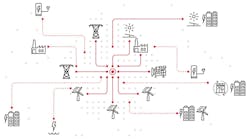IBM has developed a new technology, now piloted with Shanghai Power, to help energy companies manage power outages more effectively while improving productivity. Developed for the energy industry by IBM Research, the technology can upgrade and transform a power grid by reducing outage frequency and duration of black-out time while optimizing the company's resources and assets.
Working with consultants and researchers from IBM, Shanghai Electric Power Co. has installed the Integrated Distribution Outage Planner (IDOP) as it is transforming its power grid to minimize power outages. These outages can jeopardize network reliability and service quality for its customers and as one of the largest power companies in Asia, Shanghai Power generates more than 20 billion kilowatt per hour of electricity per year.
Since the project was completed earlier this year, the rate of equipment availability at Shanghai Power has increased significantly, and the company's sale of electricity has increased by 50 million kWh per month, which is equal to an incremental revenue of 35 million Yuan (US$5.1 million) a month.
Since maintenance is often done manually, power outages can occur at a more frequent rate. Shanghai Power, for example, performs 5,000 to 6,000 maintenance tasks and tests every month. The company wanted to use IDOP to automate the inter-departmental processes to ensure better management of maintenance so that outage risk is minimized.
IDOP, an online, real-time outage-planning tool, integrates data from relevant departments and processes and manages the schedule of different types of power outage tasks. Using IBM's analytics and optimization technology, IDOP allows the power grid to draw data across the company to conduct analysis of possible factors causing outage and excessive energy consumption. It also can provide scientific arrangements of outage tasks, including the time frame and load transfer path for each outage task. This helps to minimize security risks, increase workload balance, and reduce the amount of time spent on monthly coordination of scheduled power outages from half a month to just a few days.
The IDOP project is part of IBM Research's First-Of-A-Kind program (FOAK) where IBM engages clients' experts in research projects to explore how emerging technologies could solve real industry problems. The collaboration exemplifies IBM's commitment to being part of the industry ecosystem supporting clients and business partners to solve industry-specific issues.
China's energy demand is expected to grow at about 5.5 percent per year through to 2020, and the Chinese government has allocated US$7.3 billion to energy system reform.

